Text



he uh. he sure is one of a kind
5K notes
·
View notes
Text
Thinking about the werewolf from the hate mail Lemgo council pharmacist David Welman (1595 - 1669) got after being accused of being a werewolf
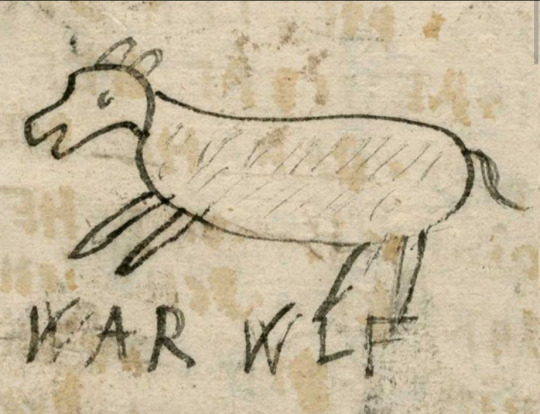
76K notes
·
View notes
Text

A beautiful Victorian diamond-set anchor sweetheart brooch/pendant c.1880
295 notes
·
View notes
Text

Not what I was looking for but thanks anyways google
#The mole people#Do not thank Google for this movie#And especially do not watch this movie#Fuck this movie
43 notes
·
View notes
Text



poor sad hungry creature, you’re making me nervous sign? slim jim pitcher. all in the same day.
563 notes
·
View notes
Photo
This guy needs to fight Gamera.
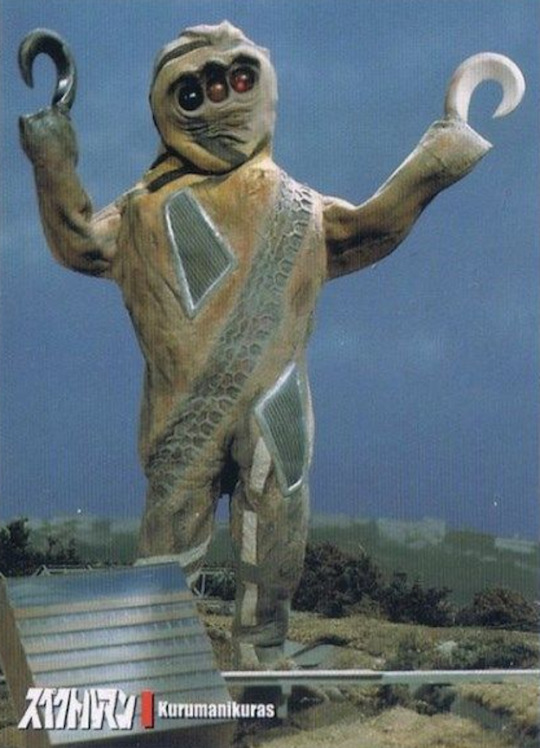
(via The Grim Gallery: Exhibit 4131)
Kuruma-Nikuras from the Spectreman episodes “Traffic Accident Monster Kuruma-Nikuras!” and “Danger!! Kuruma-Nikuras” (June 5, 1971 and June 12, 1971)
337 notes
·
View notes
Text






One funny and one confusing shirt that came through my thrift job
Super interesting toy that sadly didn’t work
Oreo panda?? I feel like that is marketing genius
LORGE I dog?
These wall art signs are starting to get concerning…
248 notes
·
View notes
Text
AU: Old Man Crenshaw raises the Little Creature as his son.



a clown piggy bank, vases full of buttons that have been there for weeks, and A Guy. Local thrift shop
121 notes
·
View notes
Text
Look, polish!

Goodwill in North Carolina, USA
2K notes
·
View notes
Text
Finally got around to seeing JW Dominion. It is now the second-worst film I've ever seen in which Malta is menaced by a lumbering prehistoric beast.
18 notes
·
View notes
Photo
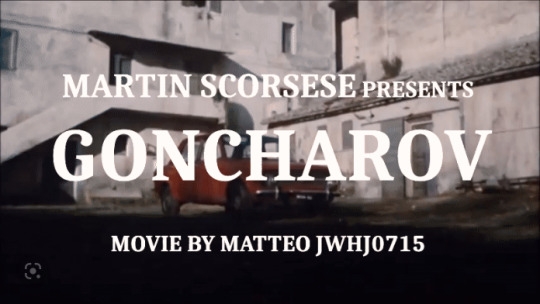
Goncharov
Why the hell is an MST3K blog rising from the dead to review a forgotten Martin Scorcese film? I'd never heard of this movie until it suddenly became a meme, but I had a day off work and I figured I might as well see what all the fuss was about. Now I want to talk about what I saw, and this is the only movie blog I have, so I'm doing it here.

Ivan Goncharov is the biggest, baddest motherfucker east of the iron curtain, richer than a tsar and colder than a Siberian winter. He's got a beef with Neapolitan mafioso Mario Giglioli, so he heads to sunny Italy to confront him in person. His closest confidante, Andrey, thinks it's suicide to do this on Giglioli's home turf but accompanies Goncharov anyway out of loyalty. What follows is a two-hour dick-measuring contest as Goncharov and Giglioli try to out-intimidate each other, culminating in an orgy of gunfire where only one will be left standing... and this is the kind of movie where you can't take it for granted that it'll be the guy whose name is the title.
That's the ostensible plot, anyway. What makes Goncharov a far more interesting film than such an outline might imply is that the argument between the mobsters is just a backdrop. Having set up Goncharov's hard as steel, cold as ice reputation in the first act, the movie then sets about deconstructing it. Goncharov goes from a terrifying figure devoid of all morality to a tragic antihero, a man who has come to believe his own hype so completely that he can no longer let himself be human.
This is demonstrated mainly by watching the breakdown of his relationships over the course of the tense three days in Naples. The most important person in Goncharov's life is Andrey, the only one he comes near being vulnerable with. Their relationship is depicted as very touchy-feely in a literal sort of way, with Andrey helping Goncharov with his coat and shoes, lighting cigarettes for him, and touching his shoulder or arm as Goncharov confides in him. The framing emphasizes these touches in a very homoerotic way, and I don't think I've got my tumblr goggles on here. These guys have fucked.
As Goncharov becomes more and more obsessed with being tougher and more ruthless than Giglioli, whom he sees as an effeminate softie, Andrey tries to persuade him that the other man is not worth this sort of obsession. Whatever Giglioli did to insult Goncharov (we never find out), Andrey is of the opinion that they should just leave a dead horse in the asshole's bed and move on. Goncharov's pride will not allow him to do that, and the less subtle Andrey is in his attempts to dissuade him, the more Goncharov pushes him away, finally abandoning him entirely. The tragedy of the ending comes from the fact that Andrey refuses to abandon Goncharov in turn.
We also see Goncharov with his wife Katya. He is frequently cruel to her, and she tolerates it because he gives her expensive gifts and because she is seeking a vicarious mending of her relationship with her abusive father - she was never able to earn his love, but perhaps she can earn Goncharov's. This is doomed to failure, as much because of Goncharov as because Katya doesn't actually want it to succeed. Nursing a black eye, Katya pours her heart out to a bartender, Sofia, who tries to help her escape... but this cannot work out, either. As Katya herself says, she doesn't know who she is without her issues.
I am pleased to note, by the way, that every single major character in the movie is named and I can remember them all, which is a bit of a treat for me (I need to watch good movies more often). The only exception is Goncharov himself. The end credits list him as Ivan, but nobody ever calls him that, not even Andrey or Katya. In a flashback scene with his parents, neither calls him by name. This flashback, fascinatingly, is filmed in the first person, looking through Goncharov's own eyes. We are not allowed to see him as a younger, softer man. He refuses to show that side of himself even in the privacy of his memories.
These quieter moments contrast with scenes of ever-escalating brutality, as the Russians and Italians try to force each other to back down by the murder of underlings. The fact that it is literally a contest, and that Goncharov is aware of this and describes it as such, makes the worsening violence ever more meaningless. The death of Giglioli's confessor is particularly awful, and the way Goncharov's goons treat the chapel has to be ten times worse if you're Catholic (fun fact: this scene is apparently removed from the Italian version on Netflix, which must make what Andrey says while waiting for the train into a hell of a non sequitur).
At the climax, the two really can't do anything but kill each other, because it's the only place left to go. Giglioli's priest and mistress are dead. Goncharov's men are almost all dead or out of action, and Goncharov believes Andrey to be dead. The initial insult, whatever it was, is no longer relevant. They have pushed each other to a place where reconciliation is unthinkable. Whoever blinks first loses, but both have already lost so much that victory means nothing. Worse, each recognizes that the other is in the same position, and neither can acknowledge it.
This means Goncharov can also moonlight as an examination of violence in media. Why do movies showcase violence, and why do we watch it? The initial posturing serves a purpose - Goncharov wants Giglioli to know he's here to personally demand an apology, and Giglioli wants Goncharov to know he's outnumbered and should quit while he still can. But once it becomes an exercise in one-up-manship, the 'messages’ vanish and the men are now killing for the sake of killing. Violence in movies can often be gore for gore's sake, pulling out more and more stops in the effort to shock an audience that has been desensitized by years and years of this. That is what Goncharov and Giglioli are doing to each other. Truly distressing moments like the fate of the priest, or what Giuseppe "Icepick Joe" Cozzolino (dressed as a maid!) does to Sofia when he assumes she's Katya because she was in Katya's hotel room, make us wonder why we're watching this - and the mobsters wonder why they're doing it.
In the end, it's all just a blood-soaked version of the sunk cost fallacy. Goncharov had come too far in his vendetta to stop now. Andrey has followed him too far to turn back. Katya has been married to him too long to leave. Of course, any of them could quit at any time and escape from this terrible spiral, but they are unwilling to entertain the possibility. Like Goncharov himself, Andrey and Katya are prisoners of the identities they have built for themselves, and because their identities are so tied to him, they have to go down with him.
One thing I haven't seen a lot of discussion of on tumblr is the way the film uses the contrast in climate. Goncharov in Moscow is in his element. When you see his breath in the wintry air it's as if he's breathing smoke like a dragon. While other people huddle in the cold he stands up straight and tall. In Naples, on the other hand, he is out of place. He wears lighter clothing, but continues to choose long coats and upturned collars, while Giglioli goes around with his shirt unbuttoned. This should serve to emphasize Giglioli's home field advantage and yet, as we see through Goncharov's eyes, they just make Giglioli look soft. His apparent weakness makes Goncharov want to appear even stronger.
On a related note, it is interesting to me how sunlight is treated as something very unfriendly. In Russia, it glitters on ice crystals in the air and lights up condensation, harsh and white and giving no warmth whatsoever. In Italy it bakes and shimmers on stone and asphalt, casting harsh, black-edged shadows and emphasizing creased brows and frowning mouths. Outdoor scenes are, as far as I can tell, always hostile interactions. Even indoor scenes in natural light: the priest dies with harsh sunlight streaming in through the broken chapel window. When characters are softer with each other, it is always under artificial illumination. Sunlight is too bright, too revealing. People like this need some shadows to hide in.
Did I like this movie? That's a tough question. It's not really the type of movie you 'like'. It's definitely powerful and well-constructed, thoroughly absorbing and all that. There's a taste of Greek tragedy in the inevitability of the ending and the way Goncharov is eaten alive by hubris. But I wouldn't say I liked it. The characters are all terrible people whose arcs involve them getting worse, and the whole thing feels deeply claustrophobic, as if I, too, am trapped in Goncharov's downward spiral. When characters realize their mistakes, it is only when it's too late to correct them - but only in their own minds. It's a very pessimistic story, about human beings who are overcome by the very worst parts of themselves.
Is Goncharov deserving of all those glowing reviews? Yes. Was it unfairly snubbed at the Oscars because the academy was turned off by the violence? Probably. Will I ever watch it again? Fuck, no.
Excuse me, I have to go watch some Pixar movies if I ever want to smile again.
#mst3k#reviews#episodes that never were#goncharov#70's#there are horses in this movie#unreality#in case you've been on twitter or something all day#this movie doesn't exist.#i read six text posts and pulled this out of my ass at one in the morning
443 notes
·
View notes
Text
MY GOD, DAVID.
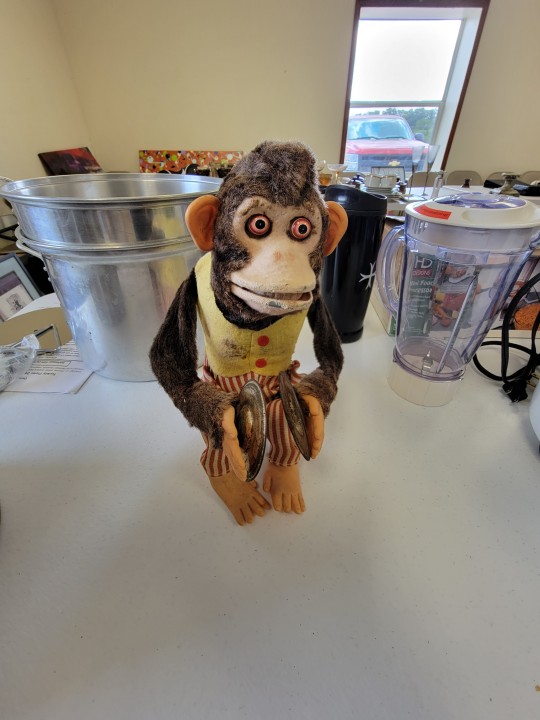
At the community center in my extremely small town (I don't want to name because we're a population of 440+ people and way too easy to be found) in Oklahoma, I found this well used Jolly Chimp. He's seen some better days.
798 notes
·
View notes
Photo
Pol! U iz a warwilf!
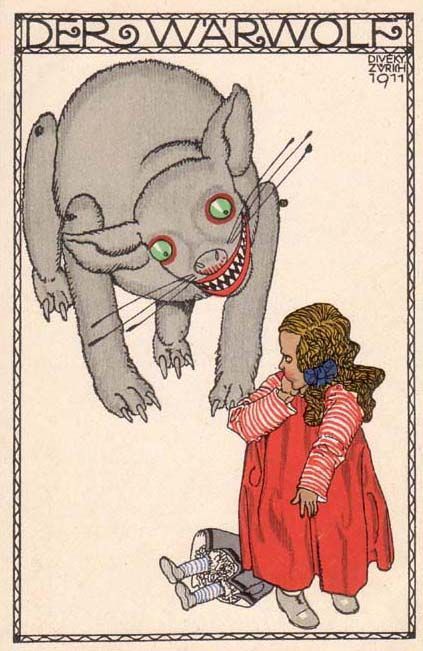
Der Warwolf - Wiener Werkstatte Postcard by Josef Diveky, 1911
763 notes
·
View notes
Text
Hi guys.
This is hard for me to do, but I think I’m going to be ending this blog, or at least taking an extended break. I’ve been doing this for seven years and I’ve watched hundreds of bad movies, and my perfectionist instincts want to cover the Gizmoplex movies too, but this is no longer as much fun as it used to be. Blogging is something I do as a hobby, not something I make money at, and it shouldn’t be a chore, especially since if I’m not having fun writing reviews then you won’t have any fun reading them. So before this becomes something I groan at doing every time, I think I’m going to have to sign off. At least for a while.
Keep circulating the tapes.
51 notes
·
View notes
Photo

The Thrill Killers
In case you’ve forgotten, Ray Dennis Steckler from MUZ made more movies that starred himself under the name ‘Cash Flagg’, which is right up there with ‘Touch Connors’ on the list of Stage Names People Probably Cringed Over Later In Life. The Thrill Killers also features a number of other people who were in MUZ, including Atlas King (the foreigny guy), Erina Enyo (Estrella), and Carolyn Brandt (Marge). It’s also got Gary Kent, who was never on MST3K but did do stunts on Bubba Ho-Tep, so that’s neat. Almost all of these people are playing characters with the same first name as themselves, which seems to suggest the writers weren't feeling very creative.
A narrator introduces us to Joe Saxon, a guy attempting to schmooze his way into the movie business by throwing incredibly lame parties and inviting Hollywood bigwigs. This doesn't seem to be impressing anybody, and certainly not Joe's wife Liz, who soon gets fed up and decides to leave him. When Joe follows in the hope of winning her back, their paths cross with those of three escaped mental patients, who have been murdering their way through a bunch of NPCs as they head for who-knows-where. From there, it's just twenty minutes of bongos, people running around in the desert, and disorganized shootouts.
The narrator is only in the first five or six minutes, which is a shame, because during that time he rambles in a way that's almost as mesmerizingly incoherent as in The Beast of Yucca Flats. He even has a similar favourite word! Instead of 'progress', this is 'unreality', as he tells us that Joe is living in a fantasy of future stardom while the real world is fast catching up with him. I was very disappointed when the movie traded the Narrator for actual dialogue. He was my second-favourite character (my favourite was the horse).
The narrator also introduces Dennis Kesdekian, a Greek immigrant with a family to support. In contrast with Joe, Dennis is a realist, who intends to work hard and build a life for his children in America. The setup leads us to expect that the two men will meet and their worldviews clash over the course of the story, but it's a trick – moments later, Dennis is murdered by Steckler, who steals his car and leaves his corpse at the side of the road. This once, it's actually kind of effective, but our lesson has been learned: the movie only wants us to like these people so we can be shocked when they die, and we're not going to fall for it again.
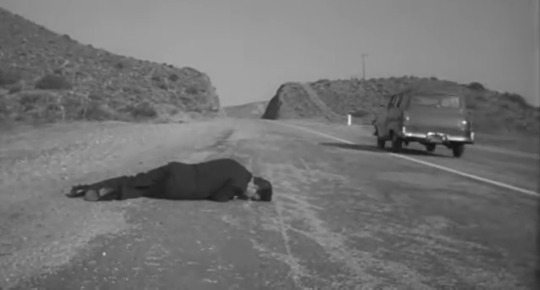
It doesn't help that the next people who crop up are obvious Designated Victims – a couple, Ron and Carol, who are on their way to look at the house they're buying in anticipation of their upcoming wedding. If that weren't enough, the house is a dilapidated wreck and Ron has to cheer Carol up by talking about how they'll renovate it as they wander around looking for the owner they were supposed to meet. Between the ominous surroundings and the couple looking forward to a bright future, these two are definitely going to die.
And they do... but man, do they take a long time about it. It's respectable as an attempt to build suspense but everything goes on just a little too long before they find the escaped murderers and the previous owner's rubbery severed head, and then a little too long again after. There was a moment in there when I thought Carol might survive and escape, but again, it's a trick the movie plays on us, and she finally dies as well.
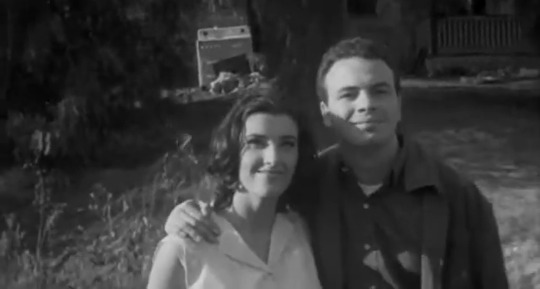
This is pretty standard behaviour for a slasher movie, but for some reason it pisses me off here. I think it's because it actually worked so well in the opening. The death of Dennis really was a surprise, but it also made me cynical. The Thrill Killers clearly doesn't care about its characters or their stories, it just wants to show me violence. When it later pretends that Carol might escape, it's only so that it can show me more violence, as the three murderers chase her, capture her, and lose her again, threaten her with guns, knives, and an axe, and as she screams and sobs and pleads for her life.
To nobody's surprise, most of this drawn-out torment is visited upon the women in the movie. Ron's end is delayed a little, but that's mostly to further abuse poor Carol – his actual death is swift, as he is beheaded. Another victim, a dancer, is teased and beaten up before finally being stabbed to death with a pair of scissors. Joe's wife Liz is chased around the desert by a knife-wielding maniac at ridiculous length, and when she finally manages to flag down a car it turns out things have only gotten worse, as the driver is another murderer! Her prolonged terror was so similar to Carol's that I was actually astonished she survived.
Other than Ron, when men die in this movie, they do so quickly and with no fuss. Dennis at the beginning is shot and dies at once. One of the escaped murderers drinks strychnine-laced coffee and immediately collapses, which I don't think is how poison works (Wikipedia bore me out on this: even strychnine takes at least ten minutes). Another is thrown off a cliff using the classic 'toss a cloth dummy over the edge' technique, which is always hugely unconvincing but often, as here, very funny. A third is shot by a policeman after a long horse chase.

We've arrived at the horse! Ray Dennis Steckler rides through the desert on a horse being chased by a cop on a motorcycle, with the terrain and the vegetation always giving just enough of an advantage for Steckler to stay ahead. This is a cool idea but it goes on way too long, and the sequence is designed to feel very different from the torturous chases of Carol and Liz. The women's escape almost always seems hopeless, and they have no weapon to fight back against their pursuers. All they can do is run, on their feet, in high heels. Steckler has a horse and a gun. He shoots several of the cops before they finally catch him, which only happens after he's been forced to abandon both mount and weapon. Where Carol and Liz were always helpless, Steckler is in a position of power even when he is desperate and running for his life.
The horse chase is easily the funniest part of the movie, though. It comes out of nowhere, for one thing – Steckler drives his car into a clearing where there's this guy in a cowboy hat sitting by a campfire. We've never seen this dude before, and we never find out anything about him (although after the previous attempts to make me care about characters who are only going to die, I'm kind of grateful). Steckler shoots him, takes his hat, and then gets the horse. We have no reason to believe this character has ever been on a horse in his life, but the stunt rider they used clearly knows what he's doing... so I choose to believe that stealing the hat magically gave Steckler the ability to ride a horse! Then there's the end of the sequence, when they get into terrain that can only be traversed on foot. Steckler abandons the horse and runs off... and the camera lingers on the animal a little as it seems to stand there going, wait, wtf just happened?

While the beginning of the movie tries to set up a theme of the fantasy of success (delivered from heaven to solve all your problems) versus the reality (hard fucking work), and then shot itself in the foot by shooting Dennis in the chest... the ending manages to be even worse. After all this stress and danger, Joe has decided to give up acting and get a real job, and Liz delightedly takes him back. Then, however, a producer phones to offer him a part – ten weeks' work at five thousand dollars per week! I have no idea how much this was in 1965 but I sure don't make five thousand dollars per week. He happily accepts, and Liz also seems thrilled, so I guess the moral of the story is that if you 'earn' them by going through some harrowing shit, your dreams really will just fall into your lap.
Beyond that, the movie doesn't even really try to have a 'theme' unless you count the inevitable 'mentally ill people are scary and dangerous and need to be locked up so the rest of us can pretend they don't exist'. It just wants to show us horrible things happening to people who really don't deserve it. The only character who might have deserved any of this was Joe, who was neglecting his relationships and chasing an impossible dream... he could have used a good slap about the head from the wet haddock of reality. But Joe not only survives, he gets his dream just handed to him in the denouement, when he was literal days away from actually trying to get his shit together!
This actually seems to harken back to something from MUZ, a movie which gets a Bert-I-Gordon-esque self-plug from The Thrill Killers in the form of a poster on a diner wall. In that movie, Steckler's character Jerry didn't want to work – he wanted to just "enjoy life". In The Thrill Killers, Joe wants to be a movie star and insists on living the Hollywood lifestyle even when he can't afford it. I know I'm not qualified to armchair psychoanalyze these people but here I'm tempted again. When Steckler's movies feature characters who want to be rich and famous without having to work for it... is he talking about himself and his own hopes for his movie career?
If so, I hate to tell you this, dude... but the reason you failed is because your movies suck.
15 notes
·
View notes
Photo
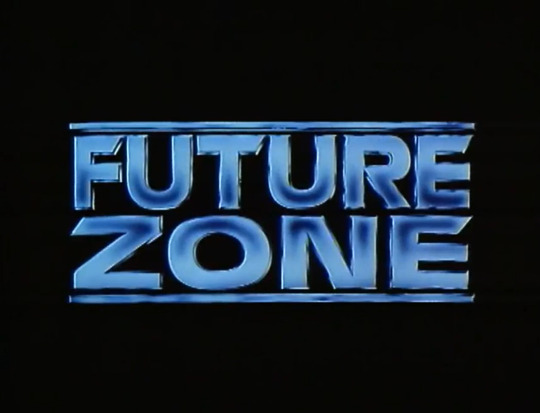
Future Zone
Both Future Force and Food of the Gods have sequels, and both sequels are bad. The primary difference between the two is that Future Zone actually does follow up the events of Future Force and features a couple of the same actors, while Gnaw: Food of the Gods II has about as much to do with the original as Troll II does with Troll. I will obviously be watching both, but I'm doing this one first.
Absolutely nothing has changed since the first movie, as John Tucker is still a grouchy asshole working for COPS, the Civilian-Operated Policing Service, which is still massively corrupt, and still keeps his robo-gauntlet in the boot of his car where it's hard to get to during tense moments. While investigating the bombing of a freight ship, he meets a guy in a see-through shirt who looks kind of like a knockoff Patrick Swayze and desperately wants to work with him for some reason. This dude turns out to be Tucker's son from the future, who has come back in time to prevent him dying in a junkyard shootout before even finding out he is to be a father. That's technically a spoiler, I guess, but it's not as if the audience hasn't figured it out way before the supposedly climactic reveal. The director still likes feet.
Rather to my surprise, there are ways in which Future Zone definitely improves on its predecessor. For one thing, they certainly had more money. Although much of the movie still takes place in junkyards and old warehouses, there are a few actual sets, like a bigger COPS headquarters. We get to see some decent pyrotechnics and a couple of halfway-impressive car crashes. The thing the film-makers seem proudest of, however, is that this time they actually have a guy with a gun in a real helicopter! Several shots seem chosen just to emphasize this. The script also manages to avoid having anything like Roxanne or the guy with the rocket launcher, characters who show up out of nowhere to resolve a situation and then vanish again.
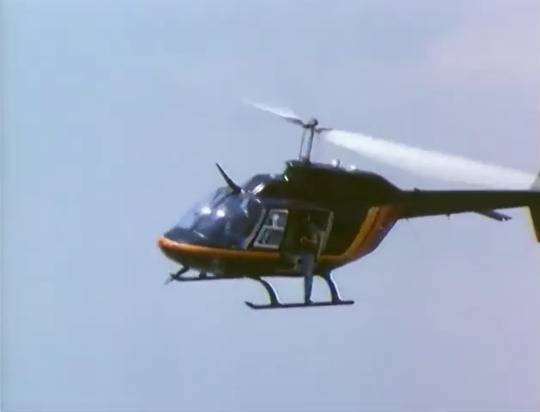
Unfortunately, in terms of plot coherence Future Zone manages to be a marked step down, which is actually kind of impressive when Future Force made so little sense to begin with! In Force, Tucker got involved because he was the first to get to Simms. In Zone he happens to shoot a few guys who were involved in the drug trade that led to the ship getting blown up, but that's rather distant from the central conflict behind it, and the fact that most of the culprits die immediately severs Tucker from situation. News broadcasts tell us that the explosion is under investigation, but we don't get any sense of Tucker taking a personal interest. He just goes straight home to get yelled at by his wife.
The wife's name is Marion. Reading a plot summary of this after having seen Future Force would probably lead you to assume that this is Marion Simms from the first movie, but I'm honestly not sure. I mean yes, at the end of that movie they drove off into the sunset in his banged-up SUV, but if it were meant to be the same person surely they've have tried to make the Marion in this installment resemble her! Marion in Future Force was a tall, elegantly dressed brunette trying to advance her career. Marion in Future Zone is a short blonde in leopard-print lingerie who spends three hours cooking a meal for Tucker and then calls him and whines about him not showing up. Anna Rapagna in Force was merely a mediocre actress. Gail Jensen in Zone is an actively bad one, with a grating delivery that makes me want to smash my computer screen with a sledgehammer.

Tucker's general unwashed-and-unkempt-ness, Marion's trashy outfits, and the hunk-of-junk nature of Tucker's vehicle makes it very funny to me that the two of them apparently live in a lovely suburban house in a nice neighbourhood.
Home life aside, through the rest of the movie we still don't get the idea that this ship bombing investigation is one Tucker feels is specifically up to him. When Patrick-Swayze-Looking-Guy, whose actual name is Billy, offers him a tip to help identify the ship's owner, Tucker takes it because he figures Billy will give it to somebody else if he doesn't, but his motives are purely financial. Later, Billy observes that “somebody wants you off this case”, which is jarring to the audience because we haven't really gotten the idea that Tucker is on this case, and he certainly never seems to want to be. The impression is that David Carradine is fed up with this movie and wants to go home, and he has passed that attitude along to his character.
I also feel like the script hadn't been through very many drafts before they started filming, partly because of this failure to get Tucker properly invested in what's going on, and partly because of a glaring inconsistency. Tucker and Billy first meet in an impromptu quick-draw contest, and Tucker, impressed, asks “who taught you to shoot?” Billy replies, “you wouldn't believe me, but I learned from the best.” The obvious implication here is that Tucker will teach his son in the future... but later Billy remarks that he never knew his father, and we eventually learn that Tucker was supposed to die before Billy was even born! So who did teach him to shoot? Did anybody actually read the completed script? If so, how did they miss that?
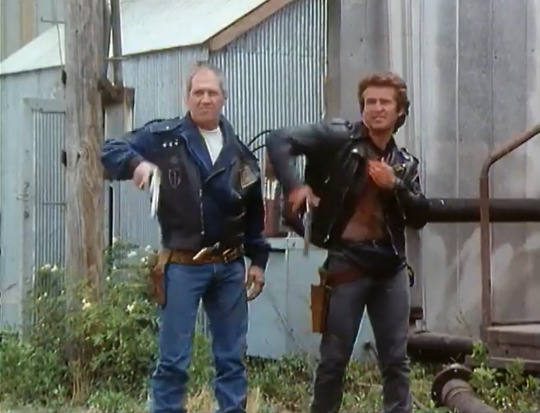
Removing the line would also do wonders for the suspense. We knew this guy was a time traveller from the moment he appeared in a beam of blue light, because we all saw The Terminator, but the line about I learned from the best combined with his refusal to use a name for the teacher pretty much seals the deal that this is Tucker's son and/or protégé. From there we just spend the rest of the film waiting for Tucker to figure it out himself, and it's a little annoying that they save it for the very end because we never really get to see anyone try to deal with this information.
Billy Tucker is, by dint of the situation he's in, the most interesting character here. Ted Prior is not a great actor, but he manages to do one thing nobody else in the cast does, and that's shed some light on his character's thoughts without having to talk about it. Tucker is Billy's hero, and he is barely containing how absolutely giddy he is to havemet him. His glee at the cars he's driving and the music he's hearing is also evident, and even though we later find out he's got a bigger purpose in coming here, it would be easy to believe that this is something Billy is doing purely for fun.
That brings us to possibly the only thing in the movie that actually makes the viewer want to think. Everything we see in Future Zone makes this look like a terrible world to live in. The streets are filthy, the city is full of crime, drugs, and terrorists, the music is bad, violence is everywhere, and the people look like they smell of BO and cigarettes. Yet to Billy, this is the Good Old Days, an era he knows only through the romanticized tales of his elders, and he behaves like a kid who's found himself in the Wild West. He runs around punching people and shooting things and acting like it's all a jolly lark, until the possibility of consequences suddenly slaps him in the face.
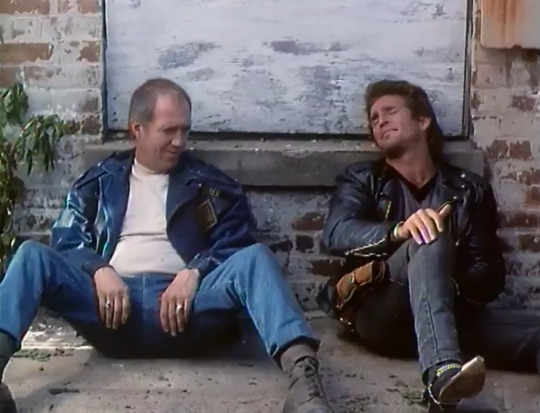
The first thing this leads us to wonder is what the hell is Billy's future like, if this seems like a fun era to hang out in? We never get any answer to this, and we have to wonder if Tucker's survival will make that future better or worse.
The idea of consequences is the other place where Prior manages to pull off an acting moment. Billy took his trip through time in order to prevent his father's untimely death, but there's a moment in which he finds his meddling may have resulted in the death of his mother, and therefore his own non-existence, instead. This is clearly troubling to him and he clings to the fact of his own presence as reassurance that Marion must still be alive. Up until now he has had some idea what's going on and where he needs to be from reading about the incident, but now he's flying blind. He tries to articulate this without revealing the truth to Tucker, and is very clumsy at it, but the audience gets the idea and it's surprisingly effective.
When I compare Future Zone to its predecessor, the strengths and weaknesses of it kind of even out. It is neither better nor worse, but I guess at least it's bad in different ways. There is, however, one thing I absolutely will not forgive it for. In Future Force, when Tucker finally pulled out the remote control for his robo-gauntlet, he used it to beat the stuffing out of a guy while Tucker himself just hid behind a wrecked car – that was the best thing in the movie. In Future Zone, the remote comes out during the bit when the guy in the helicopter was shooting at them, and I was suddenly paying full attention as I hoped I would see the gauntlet punch the helicopter right out of the sky. It wouldn't have saved the movie, but it would have been awesome.
Tragically it was not to be. Tucker just puts the thing on and shoots a laser at the helicopter instead. I hope at least somebody in the writing room suggested punching the helicopter and they decided against it for budget reasons, because not to have even thought of it seems very out-of-character for these guys.
22 notes
·
View notes
